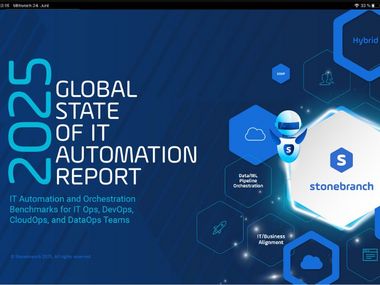Stonebranch 2025 Global State of IT Automation Report
Survey results from 400 IT pros worldwide reveal how enterprises are automating IT (and more) in 2025.

Get the Full Report Now
The world of IT automation is evolving — fast. In the 2025 Global State of IT Automation Report, Stonebranch and Censuswide surveyed 400 IT professionals across North America, EMEA, APAC, and South America to uncover how leading organizations are orchestrating automation across IT Ops, CloudOps, DevOps, DataOps, and beyond.
This year’s findings highlight a shift from tactical automation to strategic orchestration that’s fueled by hybrid IT environments, self-service adoption, and the growing role of AI.
What You’ll Learn
- Hybrid IT Orchestration is Now a Must-Have. 77% of enterprises operate in hybrid environments and need orchestration tools that span cloud, on-prem, containers, and mainframes.
- Automation Expands Beyond IT. CRM, ERP, and HR teams are joining IT in adopting self-service automation. Business-led automation is here.
- Tool Sprawl is Real… and Costly. 90% of enterprises now use more than one automation platform. Learn why many are consolidating and modernizing in 2025.
- GenAI and Data Pipelines are Front and Center. 70% of organizations now use data pipelines to power generative AI — but barriers remain in staffing and automation maturity.
- Self-Service is the New Standard. 63% of companies have 200+ citizen automators. Discover how top performers are making automation accessible for everyone.
Report Highlights
- 98% of organizations plan to expand automation initiatives in 2025
- Only 3% now consider automation a low priority — down 10% year over year
- Cloud automation and WLA/SOAP investments surged 20%
- 94% plan to automate human approvals with WLA/SOAP in the next year
Download the full 2025 report now to benchmark your strategy, identify opportunities for improvement, and lead your organization into the next era of automation.



